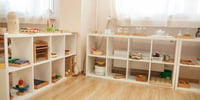LEARNING TRENDS
The Cost Of Homeschooling In The UK. It Might Surprise You!
- July 13, 2022
- In LEARNING TRENDS
- 8 min read
Thinking of taking your child out of mainstream school? Take a look at the financial considerations of homeschooling before you decide.
Learning From Home: Homeschooling Around the World
- May 16, 2022
- In LEARNING TRENDS
- 8 min read
Homeschooling is an increasingly popular option among parents. Check out our article on homeschooling around the world!
Outdoor Play: Why is it the Key to Positive Learning Experiences?
- April 27, 2022
- In LEARNING TRENDS
- 3 min read
Read our Learning Expert’s advice about how to incorporate more outdoor play into learning experiences with your child.
What Is Cooperative Learning, and Why Is it Important?
- March 25, 2022
- In LEARNING TRENDS
- 7 min read
You may have heard of cooperative learning, but do you know what this educational approach is all about? Check out our overview to find out more.
Need Help Homeschooling? The 6 Best Free Online Homeschool Curriculums
- March 2, 2022
- In LEARNING TRENDS
- 6 min read
Homeschooling can be overwhelming, but you don’t have to do it alone. Read on for our top picks for the best homeschooling resources–all completely free!
What Are Academies? Useful Information About This Type of School
- March 1, 2022
- In LEARNING TRENDS
- 9 min read
If you’re looking at potential schools, you might find yourself asking ‘What are Academies?’ Here’s our must-read guide to academies and how they work.
4 Surprising Disadvantages of Homeschooling
- February 23, 2022
- In LEARNING TRENDS
- 5 min read
Homeschooling is a great choice for many students, but it has drawbacks. Check out these disadvantages of homeschooling, and how to overcome them.
The Best Free Homeschooling Resources UK Parents Need to Start Using Today
- February 21, 2022
- In LEARNING TRENDS
- 9 min read
Click here for GoStudent’s guide to all the best free homeschooling resources UK parents need to start using today!
Switching to Home Learning? Here Are 5 Advantages of Homeschooling
- February 16, 2022
- In LEARNING TRENDS
- 6 min read
For some students and their families, homeschooling provides a better learning environment. Check out the top five advantages of homeschooling right here.
Is it Worth Paying for Private Schools and Which Are the Best?
- February 10, 2022
- In LEARNING TRENDS
- 12 min read
Have you ever wondered how much private schools actually cost and are they worth it? Click here to find out what the pros and cons are and what you'll pay.
Gifted & Talented Schools and How to Support a Gifted Child
- February 9, 2022
- In LEARNING TRENDS
- 9 min read
My child’s stuck at the top of the class! Take a look at the options for gifted students, from gifted and talented schools to support at home.
Want to Homeschool Your Child? Here’s What You Need to Know
- February 7, 2022
- In LEARNING TRENDS
- 11 min read
Many parents are interested in homeschooling. There are some things you need to know before you start. We’re here with the ultimate guide to homeschooling.
Could a Sudbury School Be Right for Your Child? Find Out Here
- February 1, 2022
- In LEARNING TRENDS
- 10 min read
Not all children fit neatly into the traditional education pigeonhole. Read on to find out if your child would be better suited to a sudbury school.
Types of School in the UK: Which is Best For Your Child?
- January 18, 2022
- In LEARNING TRENDS
- 10 min read
Interested in learning more about the different types of school in the UK? Keep on reading to find out about the 10 distinct school types you can choose from.
How Do 11+ Independent Schools Stand Out and How Can You Apply?
- January 14, 2022
- In LEARNING TRENDS
- 60 min read
Are you considering sending your child to one of the 11+ independent schools? Click here to find out how to get your kid accepted into their dream school.



















